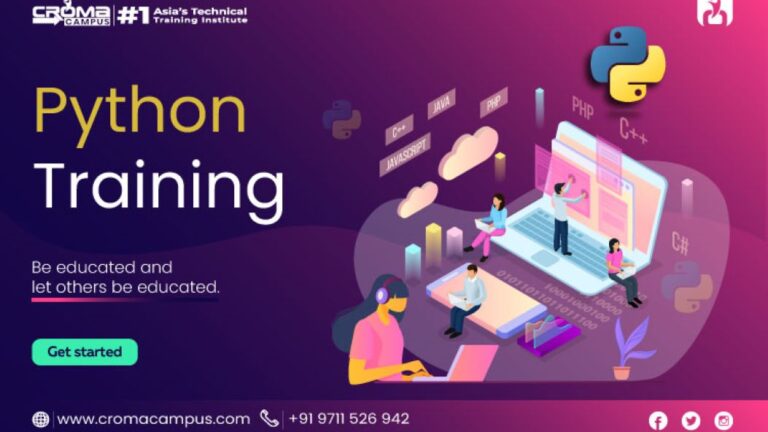Python has a simple and easy to use syntax which makes it an excellent choice for newbies. In addition, it is one of the most user-friendly programming languages because of its simple syntax and emphasis on natural language. Along with this, Python offers large and active community that contributes to the library of modules and libraries. Python offers numerous libraries and frameworks that save time and effort in the early stages of development. Furthermore, this software tool provides businesses with cloud media services and has cross-platform compatibility with library-like tools. Moreover, it facilitates automation of tasks and allows users to easily automate any monotonous task with Python. To further know about it, one can visit Python Online Course. Apart from these, given below are some significant reasons why Python is highly popular.
· Python is highly involved in the IoT sector.
· It is the best option for Startups.
· Python helps in expanding the career opportunities.
· This is a multipurpose programming language.
· Python provides corporate sponsorship support.
Uses of Python
Python is a highly popular and advanced technology and it has many real-life use cases and applications. It ensures great readability and its syntax is known for its clarity and resemblance to natural language. This is an easier to learn & understand language and is especially beneficial for beginners venturing into the world of coding. It is a simple language that reduces the amount of code you need to write and makes it easier to maintain. Along with this, Python is a versatile and powerful solution that comes with a wide range of applications. It is a general-purpose language that comes with various extensive libraries and frameworks to tackle diverse programming challenges. to further know about it, one can visit Python Online Course. Below are some of the significant uses of Python.
· Web Development- Numerous developers prefer Python because of its easy and feature-rich framework. Using Python allows you to create Dynamic websites with the best user experience.
· Data Science- Data scientist use Python for building numerous powerful AI models using Python snippets. Python also creates models and numerous neural networks which can learn like human brains.
· Web Scrapping and Automation- Python libraries such as BeautifulSoup, pandas and matplotlib, etc are also useful for web scraping and web automation. It helps in organizing the data and scaling the business by finding patterns.
· CAD- Python is also useful in CAD designs, to create 2D and 3D models digitally. It allows you to develop Python-based CAD application according to your customizability and complexity.
· Artificial Intelligence and Machine Learning- Python offers various libraries such as Pandas, and TensorFlow. These are useful for data analysis and machine learning applications for statistical analysis, data manipulation, etc.
· Game Development- Python is also a popular solution for developing 2D and 3D games. Some popular games built with Python are Pirates of the Caribbean, Battlefield 2, etc.
How to Set Up the Virtual Environment in Python?
The Python Virtual Environment is a tool that ensures that the packages related to different projects are stored in different places. It eliminates any chance of conflict and allows the environment to have its own dependencies to remain independent. Many institutes provide the Python Training in Noida and enrolling in them can help you start a career in this domain. Here are the necessary steps to set up the virtual environment in Python.
· Install Python
· Add Python to PATH
· Open a new CMD prompt (Windows Key + R, cmd.exe)
· Install virtualenv through the command pip install virtualenv.
· Check that virtualenv is installed through the command pip –version
· Install virtualenvwrapper-win through the command pip install virtualenvwrapper-win
How to Become a Python Developer?
The Python developers are responsible for writing server-side web application logic. These professionals are proficient in using Python and libraries to develop various applications. They have good understand the business requirements, user experience, and quality assurance of the software they produce. Furthermore, they collaborate with various other front-end developers, software architects, system engineers, and designers to ensure the product meets the customer’s needs. Many institutes provide the Python Training in Noida and enrolling in them can help you to start a career in this domain. Here are the necessary steps that will help you become a Python developer.
· Grasp the Fundamentals and understand the concepts like variables, data types, operators, control flow statements (if/else, loops), and functions.
· Practice Problem-solving to improve your knowledge and develop your problem-solving abilities in a Pythonic way. This will also help you tackle the difficulty levels.
· Explore the core libraries and data structures like built in modules, lists, tuples, dictionaries, and sets. Understand their strengths, use cases, and how to manipulate them effectively in your code.
· Choose your career path and explore frameworks like Django or Flask. Learning these frameworks provide structure and tools to streamline web development using Python.
· Learn Data Science & machine learning and delve into the libraries like NumPy, Pandas, Matplotlib, and scikit-learn. You will get powerful tools for data manipulation, visualization, and machine learning algorithms.
· Start building Python projects to solidify your skills. Start with small, manageable projects and gradually increase complexity as you gain experience.
· The last step is continuously learning and staying updated with the latest trends and libraries. You can follow the blogs, attend the meetups or conferences, and participate in online communities.
Conclusion
Despite its beginner-friendly nature, Python offers a powerful and versatile toolkit for various fields. To avoid dependency conflicts between projects, set up a virtual environment. By following a path of learning that includes fundamentals, practice, and exploration of libraries and frameworks, you can become a proficient Python developer. Remember, continuous learning is key to staying up-to-date in this ever-evolving domain.

